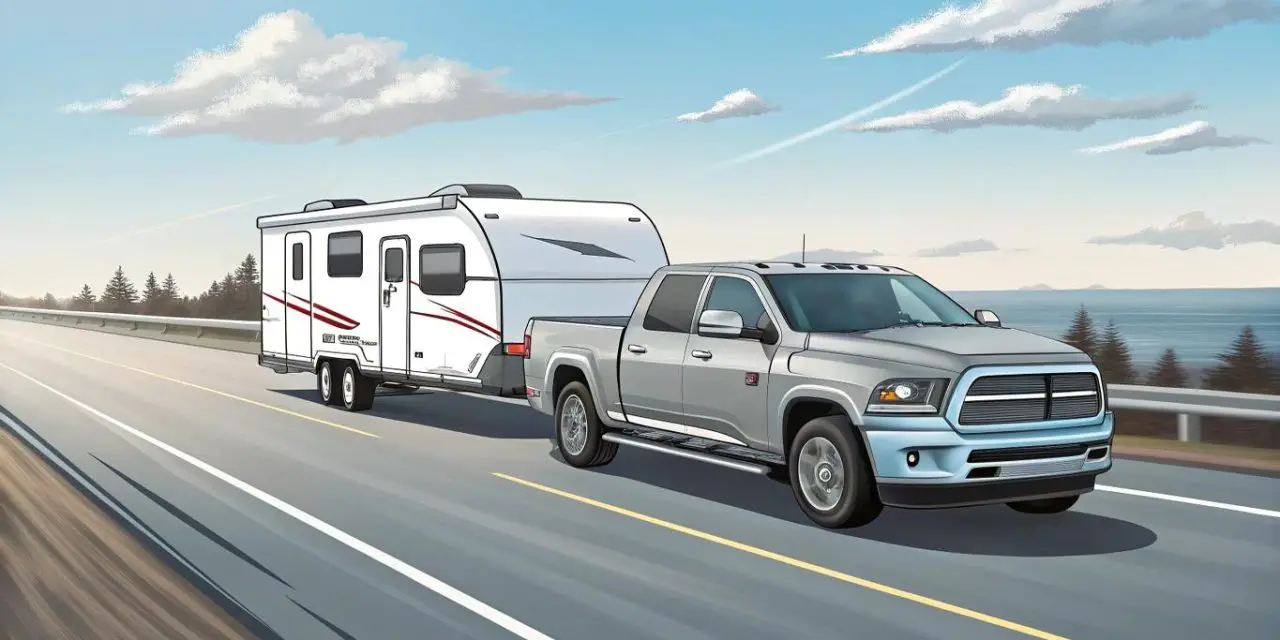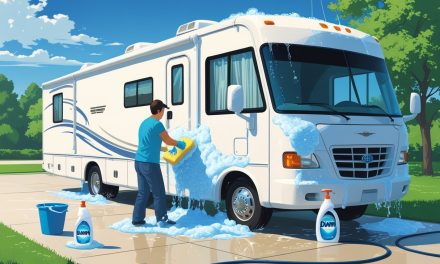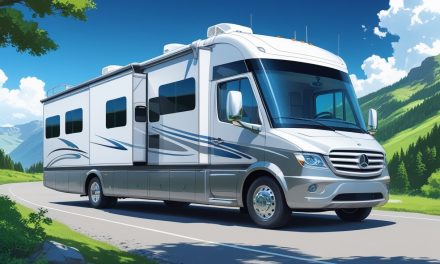Picture this: You’re cruising down Interstate 40 with your brand-new travel trailer in tow, cruise control engaged, feeling like the king of the road.
Then suddenly, you hit rolling hills, and your truck starts bucking like a bronco trying to maintain speed. Your engine revs high, your transmission downshifts aggressively, and you realize you might have just made a dangerous mistake.
If you’ve ever wondered whether cruise control is safe while towing your RV, you’re not alone – and the answer isn’t as simple as you might think.
The truth is, cruise control can be both your best friend and your worst enemy on the road, depending on when and how you use it. Understanding the difference could save your engine, your transmission, and possibly even your life.
Would you like to save this article?
When Cruise Control Becomes Your RV’s Worst Enemy
Rolling Hills: The Silent Truck Killer
You might think those gentle rolling hills on the interstate are harmless, but your cruise control system sees them as a personal challenge to maintain your exact speed. Unlike you, cruise control can’t anticipate what’s coming next.
When you approach a hill crest, you naturally ease off the accelerator because you know you’re about to descend. Cruise control keeps full throttle right up to the crest, then has to overcompensate by downshifting aggressively on the descent.
Key Statistics:
- Cruise control can cause 15-20% more transmission wear on rolling terrain
- Engine RPMs can spike 30% higher than manual driving on hills
- 76,000 RV accidents occur annually according to NHTSA data
Think of cruise control on hills like a teenager driving for the first time – it only knows one speed: full commitment to whatever you told it to do.
Weather Conditions That Turn Cruise Into Crisis
Never, ever use cruise control in:
- Wet roads (even light rain)
- Snow or ice
- Strong crosswinds
- Any slippery conditions
Here’s why this is absolutely critical: If your drive wheels hit a slick patch, cruise control might interpret the slowdown as needing more power and suddenly accelerate. That’s exactly what you don’t want when you’re already losing traction.
| Weather Condition | Risk Level | Why Avoid Cruise |
|---|---|---|
| Light Rain | High | Can cause hydroplaning acceleration |
| Snow/Ice | Extreme | May accelerate during skids |
| Crosswinds | High | Interferes with stability corrections |
| Fog | Moderate | Reduces reaction time for visibility changes |
Your cruise control system has about as much understanding of weather as a fish has of flying – it just doesn’t compute the danger.
Traffic Situations Where Cruise Control Fails You
Heavy Traffic: When Robots Can’t Read the Room
Even adaptive cruise control struggles in heavy traffic when you’re towing. While it might work great in your daily commuter car, add 8,000 pounds of trailer and suddenly those quick lane changes and sudden stops become much more dangerous.
The problem? Adaptive cruise control reacts to the car directly in front of you, but it can’t anticipate:
- Sudden lane mergers
- Multiple car pile-ups ahead
- Emergency vehicles
- Road construction zones
Winding Roads: Curves Ahead
Cruise control on curvy mountain roads while towing is like using a sledgehammer for brain surgery – completely wrong tool for the job. Your speed needs to fluctuate naturally with curves, and cruise control fights against this natural rhythm.
Modern vehicles are getting smarter about curves, but most of us are driving trucks that think a curve is just a suggestion to work harder.
The Smart Money: When Cruise Control Actually Helps
Flat Interstate Highways: Cruise Control’s Happy Place
On genuinely flat terrain with good weather and light traffic, cruise control can be your best friend. Here’s where it actually shines:
Benefits on Flat Roads:
- Reduces driver fatigue on long hauls
- Improves fuel economy by 5-7% (Volvo study data)
- Maintains consistent speed without speedometer watching
- Less wear on brakes and throttle components
Modern Tow/Haul Mode Integration
Today’s trucks are smarter than ever. When you engage Tow/Haul mode with cruise control, your truck can:
- Use exhaust braking automatically on descents
- Downshift earlier for engine braking
- Maintain proper following distance with adaptive systems
- Coordinate transmission behavior with cruise demands
The Million-Dollar Question: Does your truck’s brain work well with your trailer’s weight, or are they fighting each other?
Fuel Economy: The Surprising Truth About Cruise and Towing
When Cruise Control Saves Money
Steady speed equals better mileage – but only under the right conditions. On flat terrain with a lighter trailer, cruise control can improve fuel economy by maintaining optimal engine efficiency.
When It Costs You at the Pump
Hills and headwinds turn cruise control into a fuel-guzzling monster. Instead of letting your speed naturally fluctuate 5-10 mph on hills (which saves fuel), cruise control floors it to maintain your set speed.
Smart Driving vs. Cruise Control:
- Manual driving: Let speed drop 5 mph uphill, gain it back downhill
- Cruise control: Maintain exact speed = 30% more fuel consumption on hills
| Terrain Type | Manual Driving MPG | Cruise Control MPG | Difference |
|---|---|---|---|
| Flat Highway | 12.5 | 13.2 | +5.6% better with cruise |
| Rolling Hills | 11.8 | 10.2 | -13.5% worse with cruise |
| Mountains | 9.5 | 7.8 | -17.9% worse with cruise |
Think of cruise control like that friend who insists on doing everything “by the book” even when the book doesn’t make sense for the situation.
Manufacturer Warnings: What Ford, GM, and Ram Actually Say
Ford’s Clear Guidelines
Ford’s towing guides are crystal clear: “Turn off cruise control with heavy loads or in hilly terrain.” They even warn that cruise control may turn off automatically on steep grades.
For adaptive cruise control: Ford specifically warns lighter vehicles not to use adaptive cruise when towing trailers with their own brakes because the auto-braking won’t operate trailer brakes.
General Motors’ Balanced Approach
GM emphasizes using Tow/Haul mode with cruise control, which helps the system work better with your trailer. However, they caution that on very steep hills, you might experience speed fluctuations and should consider taking manual control.
Ram’s Conservative Stance
Ram takes the most conservative approach, explicitly stating: “Do not use adaptive cruise control when towing a trailer up or down steep slopes.” They emphasize that adaptive systems aren’t substitutes for driver control in challenging conditions.
It’s like the manufacturers are saying: “We’ll give you the tools, but use your brain about when to use them.”
Real-World RV Expert Strategies
The “In and Out” Method
Professional RVers don’t just set and forget cruise control. They’re constantly engaging and disengaging based on conditions:
Engage cruise control when:
- Truly flat highways (think North Dakota, not “flat” Iowa)
- Good weather conditions
- Light to moderate traffic
- Your truck isn’t straining
Disengage immediately when:
- Any hills appear (even gentle ones)
- Weather changes
- Traffic increases
- Your transmission starts hunting for gears
The RPM and Transmission Tell-Tale Signs
Your truck will tell you when cruise control isn’t appropriate:
- High RPM hold (above normal cruising RPM)
- Frequent gear hunting
- Engine strain sounds
- Unusual transmission behavior
Listen to your truck like you’d listen to your body during exercise – if it’s working too hard, back off.
The Bottom Line: Your Cruise Control Game Plan
Use cruise control when towing if:
✅ Terrain is genuinely flat
✅ Weather is clear and dry
✅ Traffic is light
✅ Your truck handles the load easily
✅ You stay alert and ready to take over
Never use cruise control when:
❌ Any hills or curves
❌ Wet or slippery roads
❌ Heavy traffic
❌ Strong winds
❌ Your truck is struggling
The Professional’s Secret
The most experienced RVers treat cruise control like a tool, not a crutch. They use it for comfort on long, flat stretches but never let it replace their active driving judgment.
Remember: You’re still the captain of your ship, even when the autopilot is engaged.
SOURCES
- RV Miles YouTube Channel – When It’s DANGEROUS To Use CRUISE CONTROL While Towing
- NKY Tribune – Towing Statistics and Safety
- RV Lifestyle – Cruise Control Safety Research
- National Highway Traffic Safety Administration – RV Accident Statistics
- Volvo Study – Adaptive Cruise Control Fuel Economy
- Georgia Auto Law – RV Accident Severity Data
- TheRVgeeks.com – Common RV Accidents







